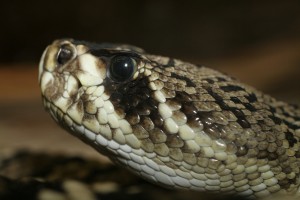Texas May Outlaw the “Gassing” of Rattlesnakes

This photo courtesy of Tad Arensmeier via Creative Commons http://www.flickr.com/photos/11304433@N00/446771802/sizes/l/
An Eastern Diamondback Rattlesnake.
Update, Jan. 23: The Texas Parks and Wildlife Department announced this week that they will delay consideration of the proposed rule outlawing the gassing of rattlesnakes. A revised rule will be proposed and considered by the department in March.
Original Story: Pouring gasoline or other noxious chemicals into the earth to force rattlesnakes and other animals from their underground homes has been a tactic of some hunters and snake wranglers for years. But it has a harmful effect on the environment and wildlife. Now, Texas Parks and Wildlife (TPWD) is considering following in the path of 30 other states and banning the practice in most circumstances.
The technique, known as “gassing” is used to capture and/or kill many different types of animals, including prairie dogs. But its greatest defenders appear to be those involved in “rattlesnake roundups” that are a tradition in parts of the state.
On the other side, scientists, animal welfare advocates and state regulators say that the time for a ban has come. When a similar ban was considered in Alabama, professionals in the snake venom collection business supported it as well, saying snakes that had been captured through “gassing” generally died before they could produce much venom, reports Outdoor Alabama.
Ken Darnell of Elmore County is in the business of collecting snake venom to use in the production of antivenin (…)
“Some of my snakes, I’ve had for six years,” he said. “I’ve never had one that had been gassed to live more than two months. You can tell when they’ve been gassed. They just act different. With a healthy snake, I can collect venom every two weeks.”
The reason Texas Parks and Wildlife gives for considering the ban is that it not only harms the environment, it kills other animals as well.
“For instance, researchers investigating the effects of one-time ‘gassing’ on gopher tortoise burrows (…) demonstrated that the practice resulted in significant mortality in four species of snake and one species of mammal,” the Department says in a press release.
The proposed rule does contain some exemptions that woulds still allow “gassing.”
“The primary exemption would exempt those who are professional exterminators,” Mike Cox, a spokesperson for TPWD tells StateImpact Texas. “You know, calls if they’re about to build a house on a piece of land and they discover its right on top of an animal den. It might be necessary still for a professional exterminator to use the sort of chemicals he or she may have available to get that target species out of that particular burrow.”
As far as the prospect that banning the practice will end the “rattlesnake roundup” tradition in Texas, TPWD says that’s overblown.

“Many rattlesnake events currently discourage the collection of snakes by gassing,” says the Department.
Texas Parks and Wildlife is taking public comment on the proposal. You can find a list of public input meetings here.
